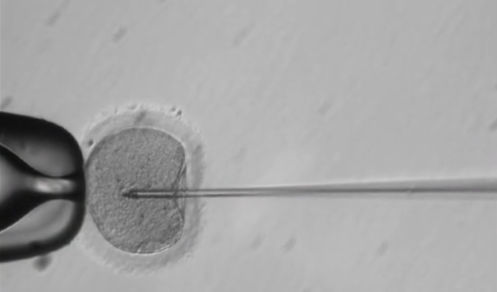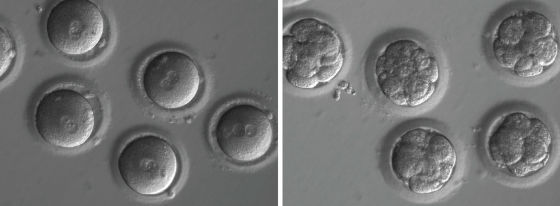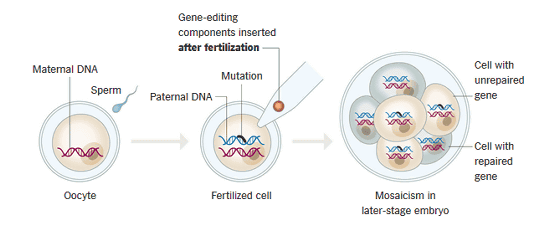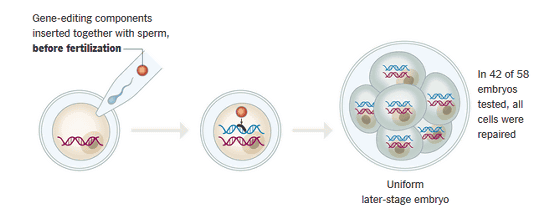Successfully, what can the US research team succeed in genetic modification by editing genome into human fertilized eggs and what can be realized?

I learned that an American research team conducted an experiment to genetically modify human fertilized eggs by genome editing. Regarding the application of genetic modification technology to human beings where ethical problems can not be avoided, only three Chinese studies have been done so far, but since the United States will join this, it is necessary to revise ethically reasonable genetic editing Sexual debate is likely to erupt worldwide.
Correction of a pathogenic gene mutation in human embryos: Nature: Nature Research
http://www.nature.com/nature/journal/vaop/ncurrent/full/nature23305.html
Brave New World? Not Even Close - Scientific American Blog Network
https://blogs.scientificamerican.com/observations/brave-new-world-not-even-close/
In Breakthrough, Scientists Edit a Dangerous Mutation From Genes in Human Embryos - The New York Times
https://www.nytimes.com/2017/08/02/science/gene-editing-human-embryos.html
On July 26, 2017, the research group of Dr. Shoukhrat Mitalipov of Oregon Health Sciences University of America conducted a genetic modification experiment using human fertilized eggsMIT Technology Review reported. In the United States the National Science Committee on the modification of human embryosGuidelinesAnd limits editing of human embryosRuleAs there are, there are many prudent opinions on genetic modification using human fertilized eggs, so a voice caught pointing out an ethical problem when reporting on research. By the way, Dr. Mitalipov is the forerunner of genetic modification studies, also known in the research of "mitochondrial replacement" technology that creates babies that will take over the genes of three parents.
What is "mitochondrial replacement" that creates a baby from the gene of "three parents"? - GIGAZINE

Meanwhile, this research on Dr. Mitalipov et al. Was announced in Science Journal Nature on August 2, 2017. Collaborative research groups in the United States, South Korea, and China have developed genes that induce hypertrophic cardiomyopathy only in sperm when in vitro fertilizing sperm with genes causing hypertrophic cardiomyopathy and healthy eggs without genetic problems I tried to cut off DNA with mutation by CRISPR / Cas9 and supplement the cut off gene from ovum.
As a result of the experiment, it was confirmed that 42 embryos out of 58 embryos are fertilized eggs without genetic mutation, success rate exceeded the theoretical value 50% without genome editing, about 72% successfully did. The fertilized eggs were discarded three days later, but it seems that they grew normally until disposal.

Genomic editing experiments on human embryos to date have added genome editing to eggs after fertilization and the problem of becoming a "mosaic" in which cells that could repair gene mutation and cells that could not be repaired are mixed occurs It was.

However, in this research, it has been reported that genome editing was carried out simultaneously with sperm insertion to suppress the occurrence of mosaic.

Dr. Richard Hinds, a cancer researcher at MIT, says, "In the past it was hardly done because genetic editing could not be carried out safely, but I think that it is a matter of time that we can no longer safely do it "I point out that it is coming to a stage where technical problems can be overcome.
Techniques for modifying the genes of fertilized eggs using genome editing technology are ultimately designed to design characteristics such as the child's intelligence quotient, exercise capacity, and lifespan in advance "Designer BabyThe voice of concern that it could lead the technology to the technology of "persevering" is persistent. In the experiment conducted this time, attempts were made to cut off the mutated part of the MYBPC3 gene inducing hypertrophic cardiomyopathy present in spermatozoa with CRISPR / Cas9 and copy and replicate the sequence of the cleaved part from the egg with the normal gene It can be said that we have not performed "editing" work that adds something to DNA. For this reason, there is also an argument from researchers that ethical issues are not technologies like designer babies that can not be avoided.
However, there are indications that the purpose of this study, "to exclude genetic mutation", can be achieved by pre-implantation diagnosis (PGD), which was already established technically, and there is little merit of applying genome editing technology , There is a negative opinion that it is impossible to avoid ethical problems about the pros and cons of genomic editing for human embryos.
Restrictions are imposed on genetic editing using human embryos in the United States, but there are of course countries without restrictions. Dr. Mitalipov strongly hopes to start clinical trials in the United States, "If genomic editing technology is not permitted to be carried out in the United States, we will support transferring technology to other countries."
Related Posts:
in Science, Posted by darkhorse_log







